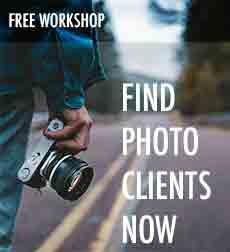
As a commercial and advertising photographer, one of the most important responsibilities you have is to be in control of your shoot. It can mean the difference between a very successful shoot and one that gets by. (Keep in mind there are no failures – it isn’t an option. Ever.)
I refer to it as “Owning Your Set” and it applies to location as well as studio work. It usually applies even more when you have a cadre of artists, talent and agency people working with you to make the shot. The more ‘cooks’ you have, the more everyone wants to add their pinch of spice.
And that can be a deal killer in the creative endeavor we call photography.
Now being in control of your shoot doesn’t mean you cannot delegate, nor does it mean that you must micromanage (something I have to remind myself of from time to time. It is also not a license to be a big asshat either. It only means you must take all responsibility, and MAKE decisions promptly and with clarity and decisiveness.
Remember that this is all your responsibility. Remember that this is what you signed up for. THIS is the big show.
And whether or not you maintain control, the end product is one you are responsible for. It is always better to be responsible for a great shoot and lots of accolades for you and your team than one that is passable and unremarkable.
At this point you may be asking if you are really ready for that responsibility.
You had better be. Seriously – if you are not, then you are not ready period. Get back to the basics and make sure you can control the creation of a photograph.
I can speak from some experience on this… heh.
I remember the shoot where it dawned on me that I had lost control and had to make a choice of either wrangling it away from the person who now commanded the most respect on the set or go with the flow and make the shots the best way I knew how. I chose the latter, as getting in a pissing match with a member of the team in front of the client is NOT something I will ever do. And I realized that my reticence and lack of control left the point position open. Nature abhors a vacuum and if I wasn’t at the helm, someone else would step up.
I had been up very late the night before on another shoot. The shoot this morning was a last minute OTR fashion thing on seamless paper and I was still thinking about the shoot last night. Questions were asked and I gave lackluster, sorta answers. I was preoccupied, and that left the door open for someone to start making decisions that I usually make.
And she stepped right through the door. The stylist, who had a very large presence and was very well known, simply hijacked the shoot. I was now following her ideas, and playing catchup to what was happening. As I was thinking of making a grand comeback with a couple of grandiose statements about my complete and utter mastery of my own domain, the client came in with two of her bosses. I knew it was best at that point to simply STFU and go with the flow. I worked hand in glove with the stylist to complete the 15 shots and never mentioned anything to her.
I hated the take. I didn’t like the poses she arranged nor did I like the makeup. I didn’t even like goddamn white paper.
They weren’t my shots. They didn’t have my signature on them at all.
I never mentioned that episode to her nor her to me, and we worked together for many more years. With me in control of every shoot.
I wish I could say that was the last time I lost control of the set, but it happened a few times after that. Hey, it takes practice to get it right.
A few things that are universal:
When you lose control of the shoot, you cannot get it back without a fight (no, no hitting or screaming, but a fight nonetheless). Fighting takes energy that should be focused on doing the absolute best you can under the circumstances YOU just created. And if you work hard and focused, you will certainly pull out a good shoot, even a great shoot. It just wont feel like your shoot.
Who takes control when you don’t?
In my experience it is first the stylist if one is on set, or the MUA if it is a beauty/headshot sort of shoot. If the client takes over, that would not be a big surprise either.
None of them are photographers, so they are now directing the photography and you are no longer the master of that part of what you do… and that is WHAT YOU DO. And fighting with the client is usually never a good idea, although I have been lucky to work with some AD’s who welcomed a spirited defense of my creative direction. Without profanity.
Which is hard for me sometimes. Just sayin’…
If you are not the photographer, you are the “camera person”.
Now I didn’t go through all I went through to be a camera person. And I am certainly not wanting to default to that by my own hand.
Camera persons don’t make much money compared to photographers. Camera persons don’t have reputations because they are camera persons and are interchangeable with any other camera person.
I am in control of every aspect of a shoot. From MU/Hair to model selection (I insist on being in the selection team). The stylists and I work tightly using private Pinterest boards and sketches to make sure we are all in sync. On set, we have music that the talent loves (Good God… what?) and all hands are on deck for shooting. I have stylists watching the clothes, and MUA’s watching the tethered capture for lipstick in the teeth/hair stuck to lips and all of the other things I may not be seeing at the time I am shooting.
That is what they are there for after all.
I also do not allow texting or cellphone surfing while the shoot is going on. If I am not shooting, then play away if you have time, but during the shoot it is everyone involved fully.
Never had a complaint yet.
Same thing for product and still life too, by the way, it is simply easier to maintain control of that set than it is when there are more people involved.
- Be certain of what you want
- Be certain that what you want is what the client wants
- Create an atmosphere that is friendly, but business like
- Keep conversations focused on the gig at hand (time for shooting the breeze over Coronas after the wrap)
- Make sure everyone seeks your approval, and make sure you are available to give it
- Never be afraid to ask for suggestions. If I am not sure which pair of ear rings I like, I ask for input from the stylist, client, model. That’s fine and it doesn’t make you look weak
- Making decisions for the sake of being ‘large and in charge’ actually DOES make you look weak
- Be complimentary to all who are working with you when they do something exceptionally good
- Make the team feel important, and part of the process. Everyone one respects a respectful leader
- Never make your problems someone else’s problem. If there are challenges, handle them with the appropriate people and do not spread unneeded drama
It is a very uncomfortable position to find yourself in when you lose control, or have a sullen or unhappy team. Keeping that from happening takes a bit of guidance and leadership from you, but it is damned worth it.
Always enjoy the work, after all it is an amazing life to be able to do what you love to do and get paid for it. And your confidence is one of the things that makes that all possible.
“Own Your Set”… always.
PHOTO INFO
The assignment came from Motorola’s inhouse magazine department. They wanted to show the strength of their data storage thingy as being something organic. We went to Venice Beach to photograph some of the body builders there. A stylist, graphic designer, writer, and two of the product managers accompanied me for the shoot. They each had different agendas, and their bickering was enough to make me want to purchase earmuffs. I kept everyone focused on the brief that had been sent out and we concentrated on that for the morning. In the late afternoon, we tried to indulge each of their ideas as best we could. I was in control, but happy to work with their creative to make something different than the brief. In the end, they used a very simple shot made while awaiting the lighting to be finished. LOL. I liked this outtake a lot. Printed on watercolor paper and scanned for a gritty, desaturated look.





Some great advice here (as always)
Thank you for the great article Don.
Cheers
Thanks Alf.